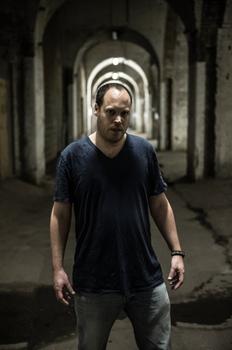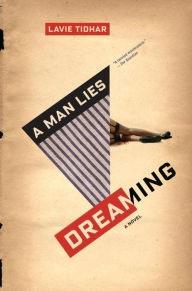
|
|
| photo: Kevin Nixon | |
Lavie Tidhar is the author of A Man Lies Dreaming (Melville House, March 15, 2016), winner of the Jerwood Fiction Uncovered Prize; Osama, winner of the World Fantasy Award; and The Violent Century, longlisted for the IMPAC Dublin Award. He's also written the Bookman Histories trilogy, several novellas, two collections and a forthcoming comics mini-series, Adler. He lives in London.
On your nightstand now:
My nightstand just tends to be an app on my phone, these days, and it's mostly loaded up with ARCs I get sent. But at the moment, I'm still trying to finish Hilary Mantel's Wolf Hall, and I've got the collected H.P. Lovecraft, who I became interested in over the past year, so I've been dipping in and out of that. Other than that, it tends to be a bunch of assorted research books from finished and upcoming novels: Timothy W. Ryback's Hitler's Private Library; Anthony Boucher's obscure roman à clef mystery, Rocket to the Morgue; John Carter's Sex and Rockets: The Occult World of Jack Parsons; and a stack of volumes on Islamic history, which I haven't dipped into yet.
Favorite book when you were a child:
Tove Jansson's Moominland Midwinter (in the Hebrew translation). I love all the Moomin books but this one in particular stayed with me.
But, too many books, really. I think I practically lived in the library when I was a child.
Your top five authors:
The writers who most influenced me (for good or bad) are probably Philip K. Dick, Raymond Chandler, Cordwainer Smith (the pen name of Paul Linebarger, who was an intelligence specialist and the godson of Sun Yat-sen and wrote the most extraordinary and peculiar science fiction stories). Tim Powers--I still remember discovering him for the first time and being so blown away. T.S. Eliot.
It's a sort of Hardboiled Five, isn't it? It's more a list of people who directly influenced my writing in some way than anything else.
Book you've faked reading:
Mein Kampf. No one can read that all the way to the end, can they? I did it for work, I needed to get a handle on Hitler's voice for A Man Lies Dreaming, but it's really quite dire, and I didn't get very far. The only thing worse is Hitler's Table Talk, a series of transcribed recordings of his after-dinner conversation, which are mostly long monologues of him ranting and lecturing his captive audience on whatever came to his mind. Book you're an evangelist for:
Book you're an evangelist for:
Kfor by Shimon Adaf. It's a Hebrew novel, not available in translation, sadly. An incredible mix of metafiction and science fiction and crime and poetry, it encapsulated so much of what I wanted to do with literature and didn't know how.
Book you've bought for the cover:
Oliver Jeffers's Lost and Found, most recently. I couldn't resist--the art is just fantastic. As soon as I saw it in the window, I knew I had to have it.
Book you hid from your parents:
It's funny, but Robert Silverberg's Across a Billion Years. I must have been about 10 years old, too young to borrow books from the adult library. But my friend got hold of it and he passed it to me, and I remember we were running to hide it from the grown-ups one night. I grew up on a kibbutz so this was in the communal children's house and we had to hide it until lights out.
Book that changed your life:
Philip K. Dick's The Man in the High Castle probably had far too much of an influence over my eventual writing career.
Favorite line from a book:
"The mind blanks at the glare." It's from Philip Larkin's "Aubade," in Collected Poems. But almost any line from that poem would do. Or almost anything from Larkin, really. I'm a little bit obsessed with him and his work.
Five books you'll never part with:
I don't think there are any books I wouldn't part with. I do collect books, and I love them, but I try not to be tied down by material objects. I have some wonderfully rare books, or books with sentimental value, though--including a Chaim Nachman Bialik chapbook published in Warsaw in the 1920s (I think) and a first edition of Joseph Heller's Closing Time, which was inscribed to me a few months before his death. But some of my favourites are books I've had since childhood--my worn-out copy of Lennart Hellsing's The Wonderful Pumpkin, for example (in the Hebrew translation). I was looking for an English edition the other day, and it's been out of print for decades. I wish someone republished it!
I also have on my shelf an inscribed copy of David Tidhar's memoirs (Be'sherut Ha'moledet, or In the Service of the Motherland). He was a larger-than-life character, the so-called "first Hebrew detective," who starred in his own series of detective stories in the 1930s. He's not a relation, incidentally! I just became fascinated by him, and he keeps popping up in short stories I wrote. I also have one of the original Balash, or detective chapbooks, from 1932, which is near priceless, I think. You can still find adverts at the back for a café in Tel Aviv "with an electric radio!" And of course Tidhar saves the day....
So this is a very random selection.
Book you most want to read again for the first time:
Maybe Harper Lee's To Kill a Mockingbird? It was the first book I read in English, and I really fell in love with it. But I am very happy re-reading it every few years instead.
Books you would take with you to a deserted island:
It's the sort of usually theoretical question I can actually answer, since I lived on one for a year (in Vanuatu, in 2007). It's a lot less exciting than you might suppose--it's essentially whatever you can pick up in a secondhand shop the day before and can fit into your luggage. In my case, it was an Ernest Hemingway omnibus and two old issues of Asimov's Science Fiction Magazine. They're probably still there.

